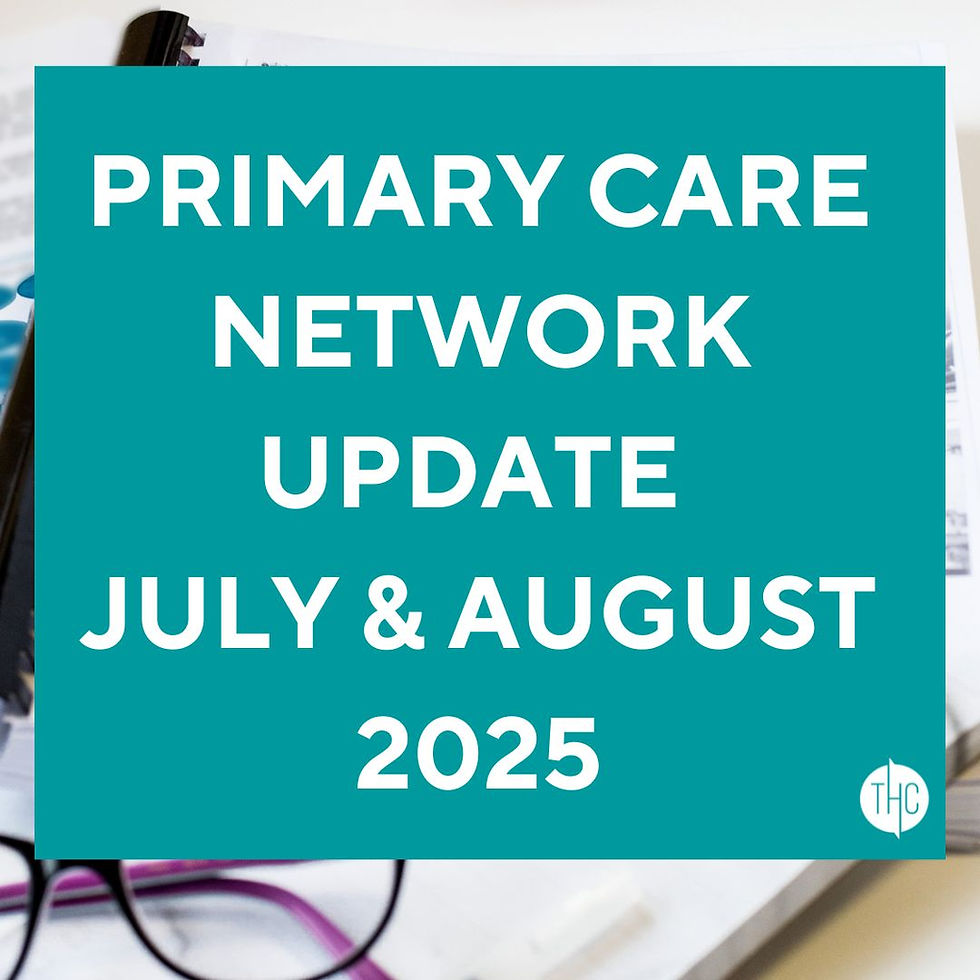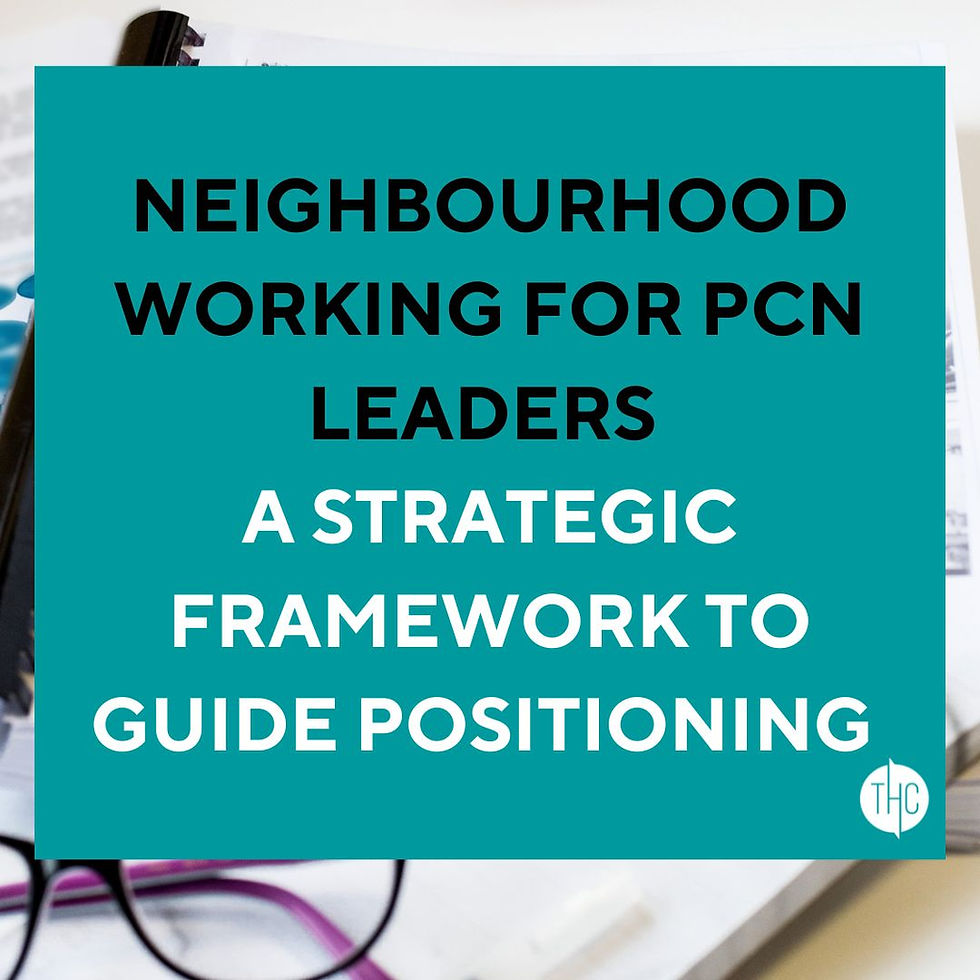NHS Neighbourhood Health Implementation: Assumptions Checklist and Facilitation Exercise to Avoid Project Failure
- Sep 8, 2025
- 3 min read
The Context: Why This Matters Now
The NHS Long Term Plan's vision for neighbourhood health represents one of the most ambitious transformations in the service's history, however... we've seen spectacular failures before when the NHS attempted large-scale change without adequately examining the assumptions underlying the approach.
What we can learn from major NHS transformation failures:
The National Programme for IT (NPfIT) - £10-24 billion failure:
The analysis of the Public Accounts Committee reports and independent reviews reveals that NPfIT's collapse stemmed from fundamental assumptions about user adoption and organisational readiness. Leaders assumed that because the technology was superior, clinicians would naturally embrace it.
Post-mortem investigations found that frontline staff were excluded from design decisions, creating systems that didn't match actual workflows.
The programme also assumed existing IT infrastructure could support integration, underestimating the complexity of connecting legacy systems across 40,000 GPs and 300 hospitals.
Integrated Care Failures - Dudley (£360m) and Wirral (£10m):
Documented reviews of these terminated contracts reveal assumptions about organisational relationships that proved catastrophically wrong.
Leaders assumed that because partnerships looked collaborative in meetings, they would function effectively in practice. Post-implementation analysis found "really poor relationships" and "hostility" between provider organisations. Both projects assumed that transferring contracts and staff would automatically create integrated services, ignoring the cultural and operational barriers that prevented genuine collaboration.
The neighbourhood health agenda faces similar challenges:
Complex multi-organisational partnerships
Diverse community needs and contexts
Integration across traditional boundaries
Cultural change alongside structural change
Limited resources and tight timelines
The most dangerous assumptions are the ones we are not aware that we're making.
This facilitation exercise helps surface those hidden assumptions before they become project-killing blind spots.
NHS Neighbourhood Health Implementation: Assumptions Checklist to Avoid Project Failure | The Exercise


What To Do With Your Assumptions Log
Immediate Actions (This Week)
For RED assumptions:
How can we test this assumption quickly and safely?
Who can help us gather evidence?
What's the minimum viable test we can do?
Ongoing Management (Monthly)
For AMBER assumptions:
What early warning signs should we watch for?
How will we know if this assumption is becoming false?
What's our backup plan?
For YELLOW assumptions:
What contingencies should we prepare?
How much effort is worth putting into testing these?
For GREEN assumptions:
Regular review - are we still confident?
Document why we believe these are true
Monthly Assumptions Review
At each project meeting:
Review your assumptions log
Update confidence levels based on new evidence
Move assumptions between categories as you learn more
Add new assumptions as they emerge
Close assumptions when you've gathered enough evidence to turn them into facts
Keep your assumptions log as a living document:
Assumption | Category | Confidence | Impact | Color | Action Required | Owner | Date to Review |
"GPs want integrated working" | Relationships | Low | High | RED | Survey all GP practices | Sarah | Next week |
"Current IT systems will integrate" | Infrastructure | Medium | High | AMBER | Technical proof of concept | IT Team | End of month |
"Transport isn't a barrier" | Access | Low | Medium | YELLOW | Community travel survey | Engagement Lead | Next quarter |
Further Support
Professional Development
If you want to master the strategic thinking behind these challenges: Join our Business of Healthcare Leadership Programme starting September 12th.
Deep dive into frameworks, case studies, and peer learning with other pioneering leaders navigating the same uncharted territory.
The PCN Members Club
If you need ongoing practical support for your neighbourhood conversations, join our PCN Members Club for just £497/year.
We have an exclusive master class coming up where I will be sharing top tips to help you facilitate your neighbourhood discussions on 4th September from 1:15pm – 2:15pm
Facilitation
If your network would benefit from a neutral voice for those tricky partnership discussions, we provide in-person facilitation too.
Contact admin@theprimarycare.co.uk to book facilitation support.
About Us
THC Primary Care is an award-winning healthcare consultancy specialising in Primary Care Network Management and the creator of the Business of Healthcare Podcast. With over 20 years in the industry, we've supported more than 200 PCNs through interim management, training, and consultancy.
Our expertise spans project management and business development across both private and public sectors. Our work has been published in the London Journal of Primary Care, and we've authored over 250 blogs sharing insights about primary care networks.





.png)

.png)

